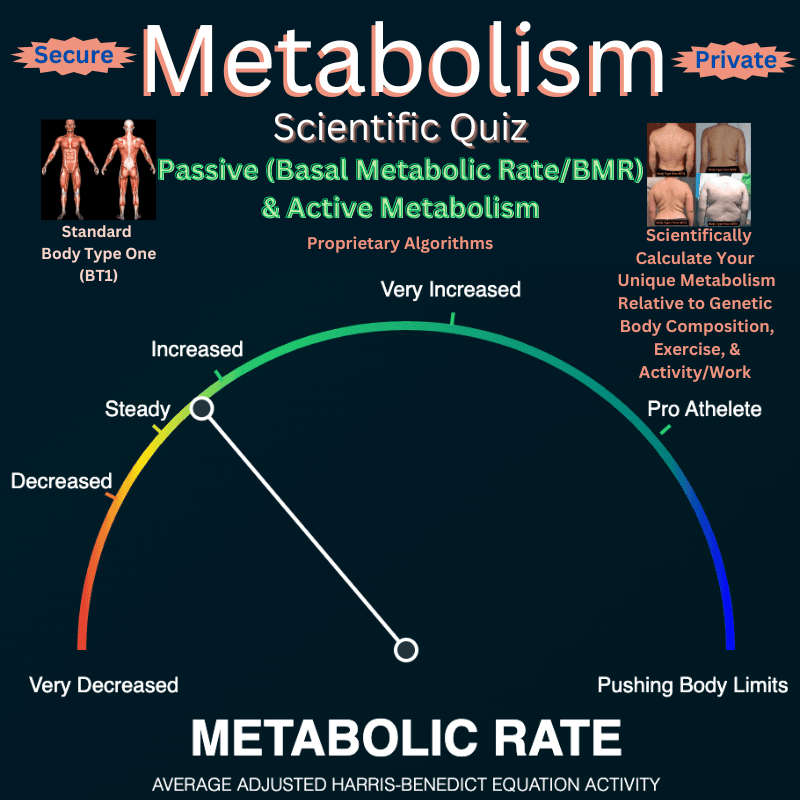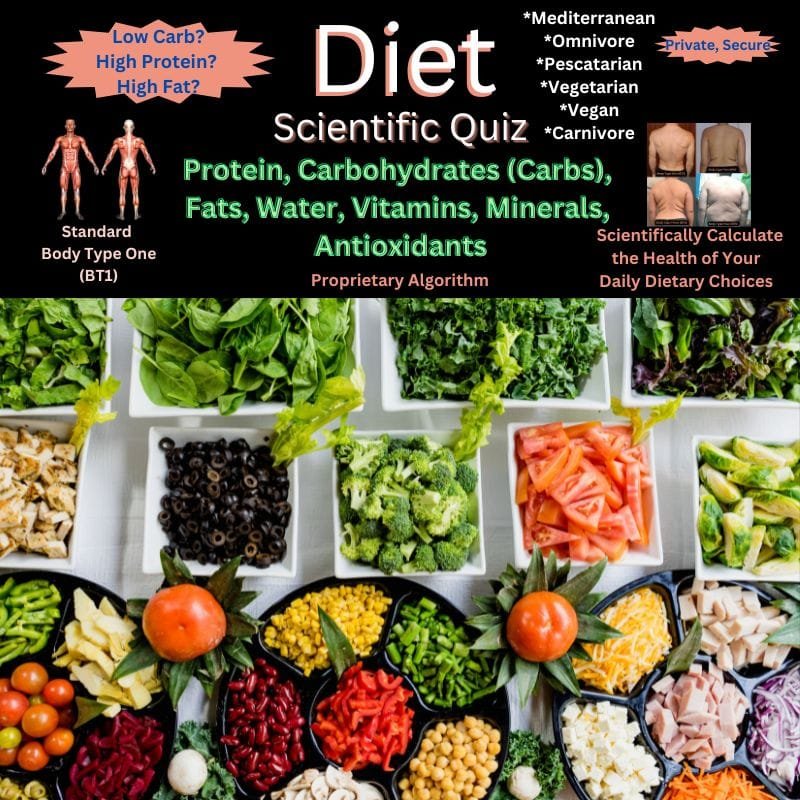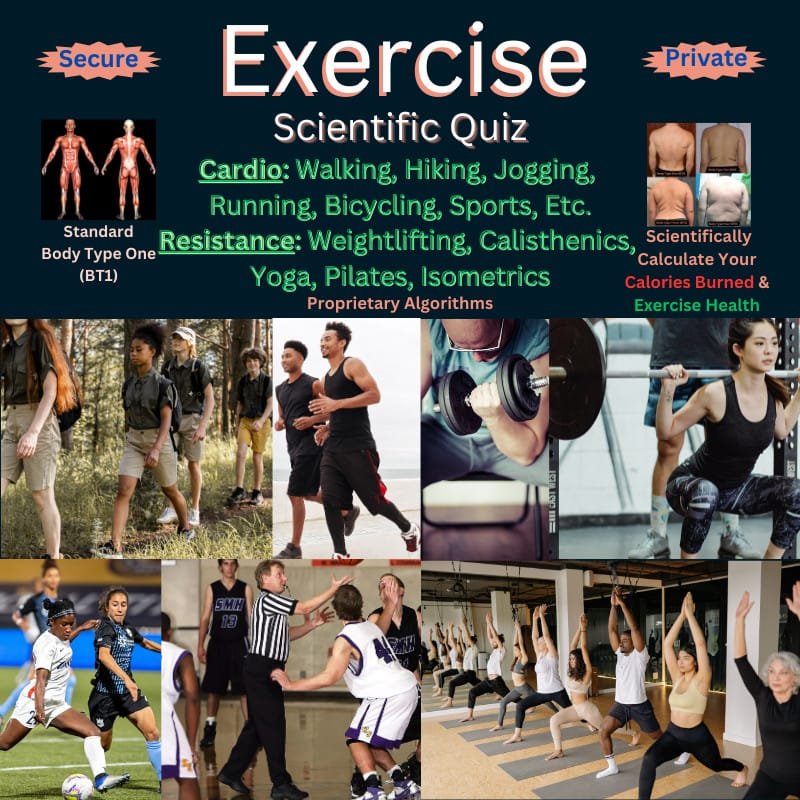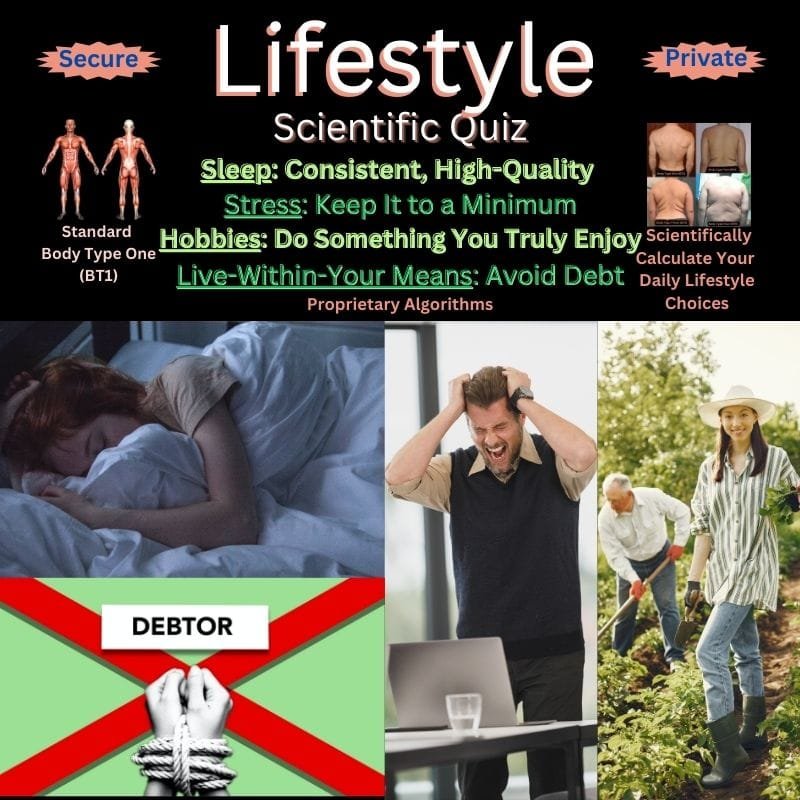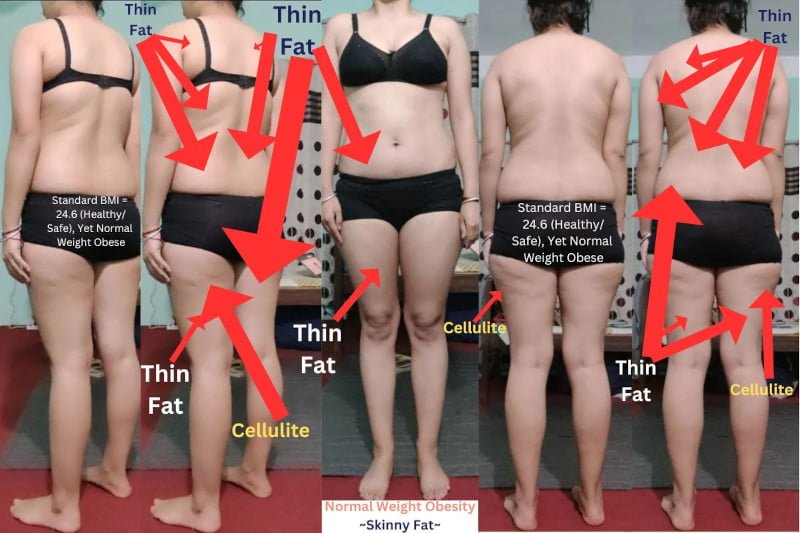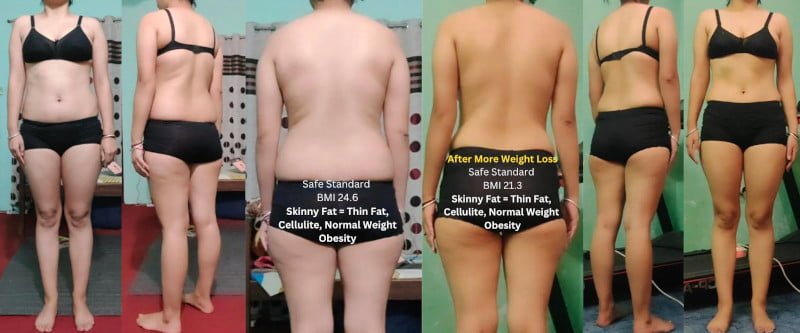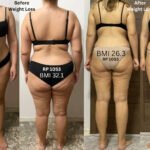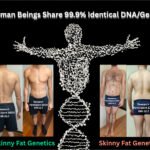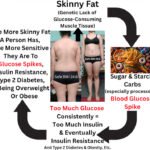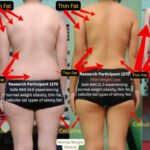Scientific Health Quizzes

Human health is very complex, making it difficult to wrangle and understand for most people. How do you know if your body composition, metabolism, diet, exercise, and lifestyle are healthy? The latest science is the answer. The Scientific Health Quizzes were developed using the latest scientific data, evidence, and facts in proprietary algorithms to calculate each person’s unique metrics.
The Scientific Health Quizzes include the Scientific Body Type Quiz (body composition and shape), Scientific Metabolism Quiz Health Score, Scientific Diet Quiz Health Score, Scientific Exercise Quiz Health Score, and Scientific Lifestyle Quiz Health Score.
Scientific Health Quizzes – Healthy Aging and Longevity

It is estimated (1, 2, 3) that 71 percent of medical schools provide less than the recommended 25 hours of nutritional education to doctors, averaging around 19 hours. It typically takes, on average, between 7 to 11 years to become a doctor (4, 5), with education and residency. This equates (6, 7) to roughly 20,000 hours of education and another roughly 18,000 hours of residency training. Yet, only roughly 19 hours of nutritional focus.
Mostly reactive, American healthcare (8, 9) is mainly for profit. It is built on the inaccurate ideas that the human body is a machine designed and destined to break down and die, that a calorie is a calorie (Calorie In/Calorie Out/CICO), food quality does not matter, and the only remedy and solution is allopathic drugs (10, 11) to delay the inevitable, no less. As science evolves and gains more knowledge, the debate (12) about whether aging is a disease (13, 14, 15, 16) is becoming increasingly clear — the negative effects of aging are mitigated (17, 18, 19, 20) by proactive, healthy diet, exercise, and lifestyle choices relative to each specific person’s unique genetic body composition and metabolism. Genetics account for less than 10% (21, 22, 23) of disease.
Don’t Die (24, 25) advocate Bryan Johnson stands at the forefront of the longevity movement. Healthy diet (food, drink), exercise (cardio, resistance), and lifestyle (sleep, stress, environment) are medicines to help legitimately expand human lifetimes. If your doctor cannot and does not help you better understand proper nutrition (diet) along with unique genetic body composition, metabolism, exercise, and lifestyle choices to be healthy, what can you do?
Body Composition, Metabolism, Diet, Exercise, Lifestyle – Scientific Health Quizzes
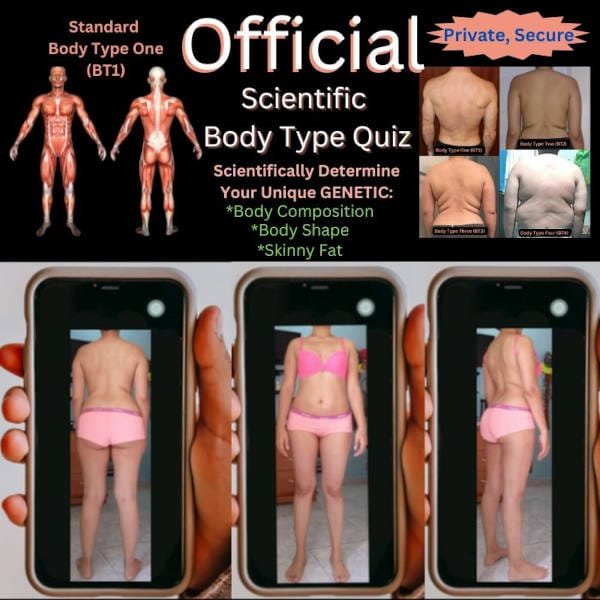
Scientific Body Type Quiz: incorporates 50+ scientifically vetted variables to accurately determine your specific body composition — muscles/muscle mass tissue, regular white/yellow body fat/adipose tissue, and skinny fat tissue (thin fat, cellulite). It helps you better understand your unique genetic body composition (from birth), where you are experiencing skinny fat (if any), your specific body shape, current body composition, and the effects of all of that on regular fat weight loss, gain, and management, at least.
At this time, there is no technology — including an MRI machine — that can accurately diagnose skinny fat tissue. Because, as of December 2024, doctors have no officially-accepted way to formally diagnose (26) skinny fat tissue. In fact, nearly all doctors (27, 28) have no idea how much genetic default muscle/mass their patients were born with or how much they have now. As you read this now, you very likely have no idea how much genetic default muscle mass you were born with, let alone how much you had before or after weight loss at any given time.
Just as it is a fact that every human being is born (at or around birth)(28, 27) with all the genetic default muscle tissue (fibers) they will ever naturally have. Some have more. Some are genetically blessed. And some have less. Those experiencing less are experiencing genetic skinny fat tissue where genetically they should have default genetic muscle/mass. Which directly affects no less than body shape, metabolism, athleticism, diet, exercise, lifestyle, and day-to-day living.
Scientific Metabolism Quiz Health Score
Utilizes 20+ scientifically vetted variables to accurately calculate your unique metrics and metabolic health score (if your metabolic rate is decreased, steady, or increased) using a proprietary algorithm. Helps you better understand your Standard BMR (basal metabolic rate) and TDEE (Total Daily Energy Expenditure) calories and if your metabolism (calories burned) is slow, normal, or fast. As well as the metabolic effects of diet, exercise (cardio and resistance), work/activity, and lifestyle (sleep, stress). And how all that affects regular fat weight loss, gain, and management, no less.
Scientific Diet Quiz Health Score
Incorporates 15+ scientifically vetted variables to accurately calculate your unique metrics and diet routine health score using a proprietary algorithm. Helps you better understand your safe minimum, mid-range, and maximum weight. How much protein, fat, and carbohydrate (and types) intake your specific body needs. As well as the best overall scientific diet and scientific weight loss diet, including safe calorie deficit, for you and your gut flora health.
Scientific Exercise Quiz Health Score
Uses 12+ vetted scientific variables including the latest MET Values (metabolic equivalent of task) in a proprietary algorithm to accurately calculate your unique metrics and exercise routine health score. Helps you better understand if you are exercising too much, too little, or the right amount. Along with how many calories your unique burns doing specific cardio and resistance exercises.
Scientific Lifestyle Quiz Health Score (Coming Soon)
Your unique metrics for sleep, stress, and environmental variables, no less, are accurately calculated in a proprietary algorithm to determine your lifestyle routine health score.
Scientific Total Health Quiz (Coming Soon)
All Scientific Health Quizzes are anonymous including Quiz Results, which you review as a “snapshot” securely in your private account. You can take as many Quizzes as you want to track your private, secure, and anonymous snapshots and progress/changes over time. You can easily share your Quiz results via screenshot(s) with anyone you want.
Free options are available.
References
- American Heart Association: How much does your doctor actually know about nutrition?, American Heart Association News, May 3, 2018. https://www.heart.org/en/news/2018/05/03/how-much-does-your-doctor-actually-know-about-nutrition
- Stanford Medicine, School of Medicine: Why Medical Schools Need to Focus More on Nutrition, October 10, 2019, Lloyd Minor. https://med.stanford.edu/school/leadership/dean/precision-health-in-the-news/why-medica-schools-need-focus-nutrition.html
- Harvard Law, Food Law and Policy Clinic: Doctoring Our Diet II, Nutrition Education for Physicians is Overdue, June 10, 2024, Trevor Findley, Kristen McEnroe, Gabriel Babuch, Caleb Kim, and Emily Broad Leib. Additional authors from the Harvard T. H. Chan School of Public Health, Department of Nutrition include David M. Eisenberg, MD, and Stephen Devries, MD. https://chlpi.org/wp-content/uploads/2024/06/Doctoring-Our-Diet-II_FINAL_6.10.24.pdf
- Med School Insiders: How Long Does It Take to Become a Doctor?, July 27, 2024. https://medschoolinsiders.com/pre-med/how-long-does-it-take-to-become-a-doctor/
- U.S. News & World Report: How Long Is Medical School and What Is it Like?, January 12, 2024, Sarah Wood. https://www.usnews.com/education/best-graduate-schools/top-medical-schools/articles/how-long-is-medical-school-and-what-is-it-like
- Best Medical Degrees: The Deceptive Salary of Doctors. https://www.bestmedicaldegrees.com/salary-of-doctors/
- John Nestler: The Numbers: How Many Hours Do You Study in Medical School?, April 29, 2020. https://www.johnnestler.com/health/2020/4/the-numbers-how-many-hours-do-you-study-in-medical-school
- NIH, National Library of Medicine: In the U.S. “Healthcare” Is Now Strictly a Business Term, March 13, 2018, Nick T Sawyer. https://pmc.ncbi.nlm.nih.gov/articles/PMC5942015/
- WebMD Ignite: Proactive Healthcare: Moving Away from Reactive Care Models, May 14, 2018. https://webmdignite.com/blog/reactive-vs-proactive-healthcare-models
- Harvard Health Publishing: Is our healthcare system broken?, July 13, 2021, Robert H. Shmerling, MD, Senior Faculty Editor. https://www.health.harvard.edu/blog/is-our-healthcare-system-broken-202107132542
- NPR, Health News: ‘The Price We Pay’ Argues Rising Health Care Costs Undermine Public Trust In Medicine, October 22, 2019, Mara Gordon. https://www.npr.org/sections/health-shots/2019/10/22/767376340/the-price-we-pay-argues-rising-health-care-costs-undermine-public-trust-in-medic
- MIT Technology Review: The debate over whether aging is a disease rages on, October 19, 2022, Sarah Sloat. https://www.technologyreview.com/2022/10/19/1061070/is-old-age-a-disease/
- Harvard Medical School, News and Research: Defining Aging, November 7, 2019. https://hms.harvard.edu/news/defining-aging
- NIH, National Library of Medicine: Is Aging a Disease? A Critical Review Within the Framework of Ageism, February 24, 2024, Víctor Manuel Mendoza-Núñez and Ana Belén Mendoza-Soto. https://pmc.ncbi.nlm.nih.gov/articles/PMC10894070/
- NIH, National Library of Medicine: It is time to classify biological aging as a disease, June 18, 2015, Sven Bulterijs, Raphaella S Hull, Victor C E Björk, and Avi G Roy. https://pmc.ncbi.nlm.nih.gov/articles/PMC4471741/
- ScienceDirect, Mechanisms of Ageing and Development: Aging Fits the Disease Criteria of the International Classification of Diseases, July 2020, Volume 189, Daria Khaltourina, Yuri Matveyev, Aleksey Alekseev, Franco Cortese, and Anca Ioviţă. https://www.sciencedirect.com/science/article/abs/pii/S0047637420300257
- Office of Disease Prevention and Health Promotion: Nutrition as We Age: Healthy Eating with the Dietary Guidelines, July 20, 2021, Dana DeSilva, PhD, RD, ORISE health policy fellow, Office of Disease Prevention and Health Promotion and LT Dennis Anderson-Villaluz, MBA, RD, LDN, FAND, nutrition advisor, Office of Disease Prevention and Health Promotion. https://odphp.health.gov/news/202107/nutrition-we-age-healthy-eating-dietary-guidelines
- NIH, National Institute on Aging: What Do We Know About Healthy Aging?, February 23, 2022. https://www.nia.nih.gov/health/healthy-aging/what-do-we-know-about-healthy-aging
- NIH, National Institute on Aging: Goal C: Develop effective interventions to maintain health, well-being, and function and prevent or reduce the burden of age-related diseases, disorders, and disabilities, May 20, 2020. https://www.nia.nih.gov/about/aging-strategic-directions-research/goal-health-interventions
- ABC News: Lifestyle choices at 60 linked to dementia risk decades later, study shows, December 3, 2025, Neil C. Bhavsar. https://abcnews.go.com/Health/lifestyle-choices-60-linked-dementia-risk-decades-study/story?id=116427107
- ScienceDaily: Your DNA is not your destiny — or a good predictor of your health, December 19, 2019, University of Alberta. https://www.sciencedaily.com/releases/2019/12/191219142739.htm
- NIH, National Cancer Institute: The Genetics of Cancer, https://www.cancer.gov/about-cancer/causes-prevention/genetics
- Parsley Health Articles: Genetics and Health: What Percentage of Diseases Are Genetic?, August 29, 2024, Kelly Candela, MS, RD Health Coach. https://www.parsleyhealth.com/blog/is-health-genetic/
- Time: The Man Who Thinks He Can Live Forever, September 20, 2023, Charlotte Alter. https://time.com/6315607/bryan-johnsons-quest-for-immortality/
- The Economic Times: Bryan Johnson, age-reversal pioneer, struggles with Mumbai smog on India tour, says ‘my throat and eyes burn’, December 1, 2024, ET Online. https://economictimes.indiatimes.com/news/international/global-trends/bryan-johnson-age-reversal-pioneer-struggles-with-mumbai-smog-on-india-tour-says-my-throat-and-eyes-burn/articleshow/115890591.cms
- Skinny Fat Science: What Is Skinny Fat?, July 26, 2024. https://skinnyfat.fellowone.com/what-is-skinny-fat/
- Skinny Fat Science: Is Muscle/Mass Genetic and How Does It Affect Skinny Fat?, November 20, 2024. https://skinnyfat.fellowone.com/is-muscle-mass-genetic-and-how-does-it-affect-skinny-fat/
- Skinny Fat Science: Is Skinny Fat Genetic?, November 2, 2024. https://skinnyfat.fellowone.com/is-skinny-fat-genetic/


